- Black Capped Chickadee
Reifel Refuge, BC
January 11, 1992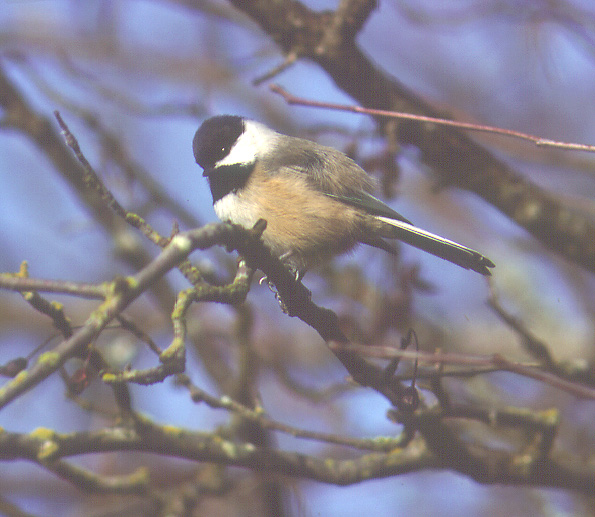
- Downy Woodpecker
Male
Reifel Refuge, BC
January 10, 1993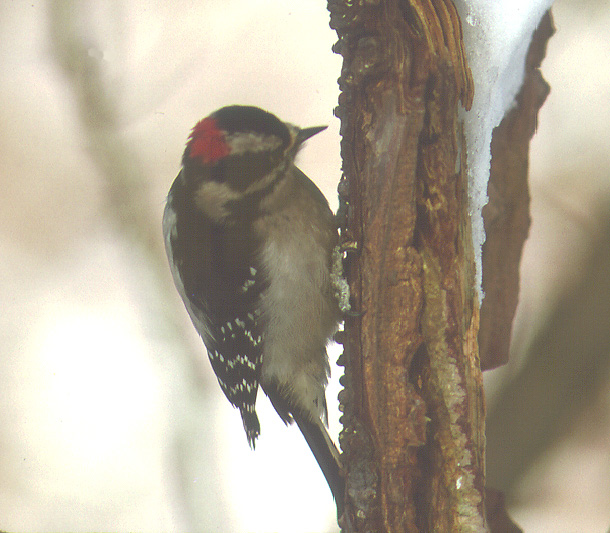
- Golden-crowned Sparrow
Port Angeles, WA
1 Oct 2005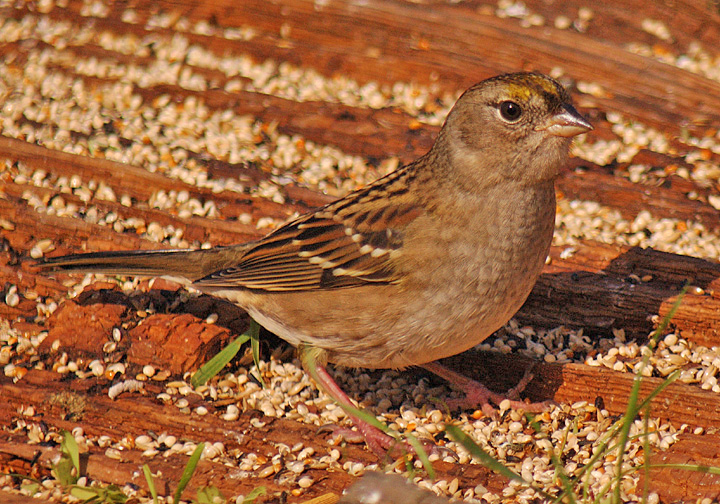
- Horned Lark
Male
Ocean Shores, WA
May 10, 1980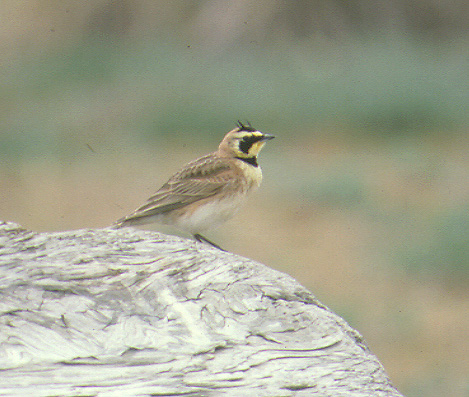
- Hybrid Mckay's X Snow Bunting
This bunting, presumably an immature male, was found by Eileen Bryant on the shore of Harrison Lake at Harrison Hot Springs, BC, on November 19, 2004 and photographed by Dennis Paulson the next day. Photos were sent to Kevin Winker and Dan Gibson at the University of Alaska Museum, who are of the opinion that it is a hybrid McKay's X Snow Bunting.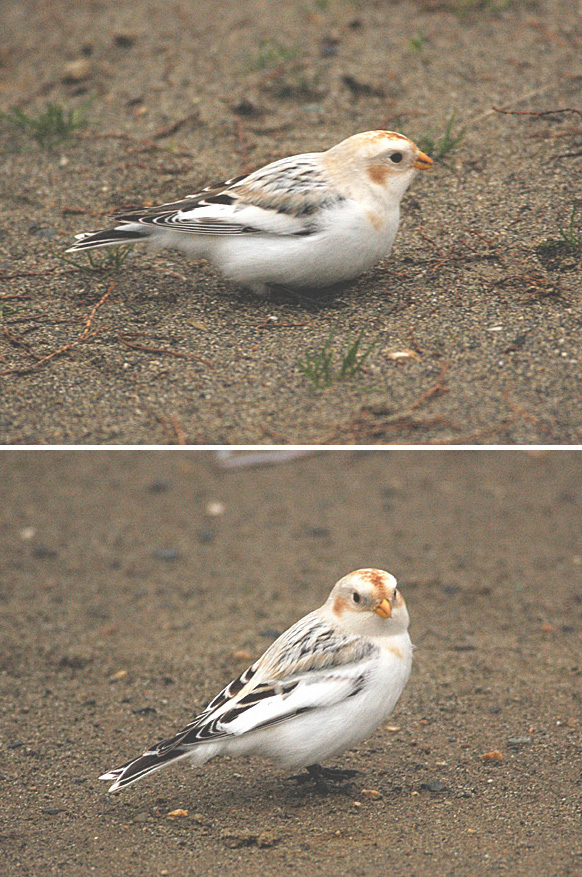
- Mystery Blackbird
This bird has been present at the Supermall in Auburn, King Co., Washington, during October 2002. Originally called a Great-tailed Grackle, it strikes me as too small and short-billed (the bill of females likely to occur in WA averages just a millimeter short of one inch in length), too short-tailed (the tail of same females averages about 5 inches, or the length of a Black-capped Chickadee), and too glossy black to be a female of that species. However, I have been reading about Great-tailed Grackle plumages, and some descriptions indicate some females can be considerably darker than others. I should add that I have never seen a female Great-tailed this dark, nor can I find a photo of one this dark. Although about the size of a Common Grackle, it seems not to be that species unless an undescribed plumage of it. The central rectrices appear to be still growing in, so it is possible the bird actually has a grackle-like graduated tail a bit longer than it looks now. It is presumably an adult bird because of the entirely pale iris. Its color matches to some degree the color of a first-year male Brewer's Blackbird, but it is much too large to be that species. The bill is larger than is typical of Brewer's but seems not quite heavy and long enough for a grackle. Is it a hybrid? Possibly Brewer's Blackbird x Common Grackle? Or even Brewer's Blackbird x Great-tailed Grackle? Great-tails have hybridized with Red-wings, and the Birds of North America account states that an apparent hybrid with Brewer's was photographed in central coastal California (C. Marantz). That bird is shown at hybrid blackbird and looks very different from the bird in question here (parenthetically, the California bird looks more like one of the tropical grackles than what I would have expected a Brewer's x Great-tailed hybrid to look like). In the case of the Supermall bird, hybridization seems more likely than an unknown species, undescribed plumage, or gigantic Brewer's Blackbird.
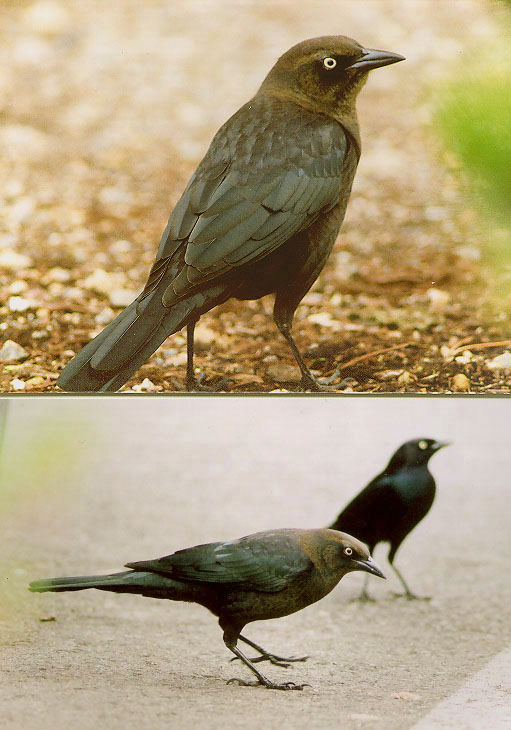
Unidentified blackbird
Auburn, WA
October 21, 2002
Photo by Ruth Sullivan.
Brewer's Blackbird, behind in the photo, is clearly smaller.Compare these photos of Great-tailed and Boat-tailed grackles from the Carnegie Museum of Natural History, kindly furnished by Robin Panza.
- Great-tailed Grackle
Quiscalus mexicanus mosoni (AZ subspecies)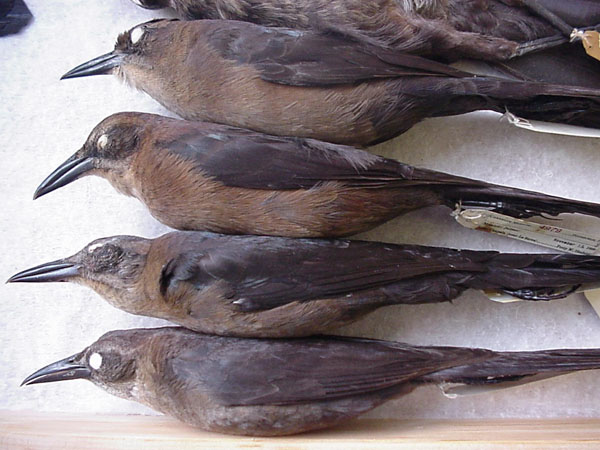
- Great-tailed Grackle
Quiscalus mexicanus propospidicola(TX subspecies)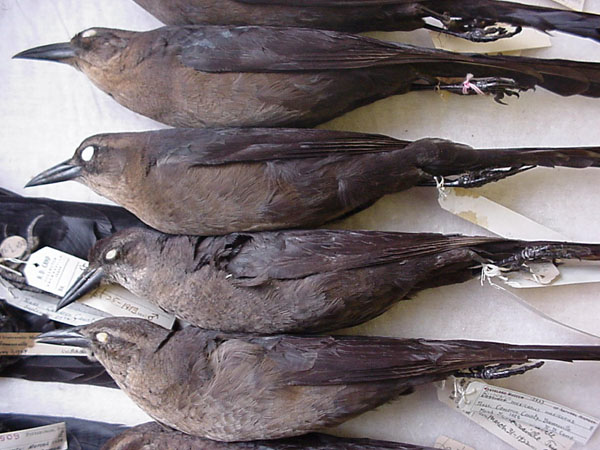
- Great-tailed Grackle
Quiscalus mexicanus obscurus(Mexican subspecies)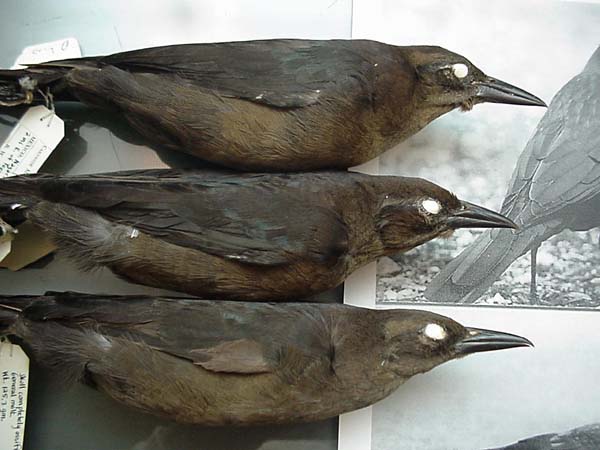
- Great-tailed Grackle
Quiscalus mexicanus obscurus(Mexican subspecies) with photo of mystery blackbird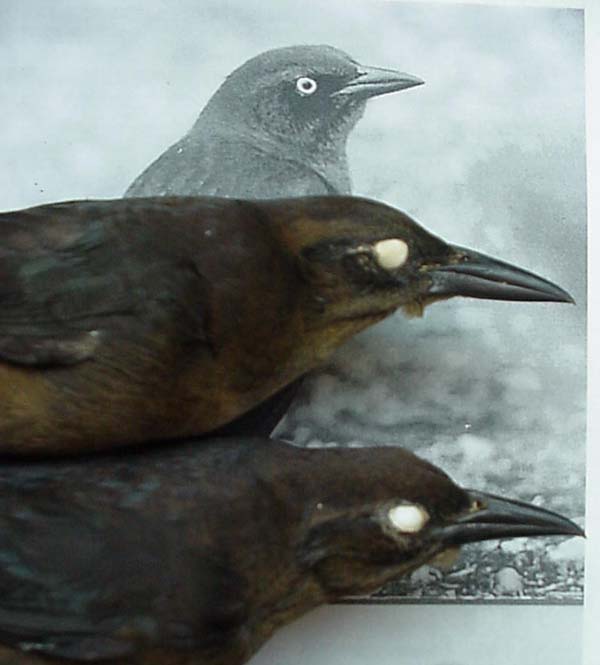
- Boat-tailed grackle
Quiscalus major torreyi (top bird, Atlantic coast subspecies) and Q. m. major (bottom two birds, TX/LA subspecies)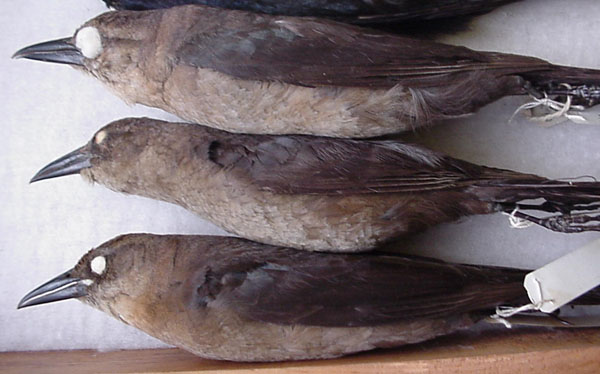
- Boat-tailed Grackle
Quiscalus major westoni (FL subspecies)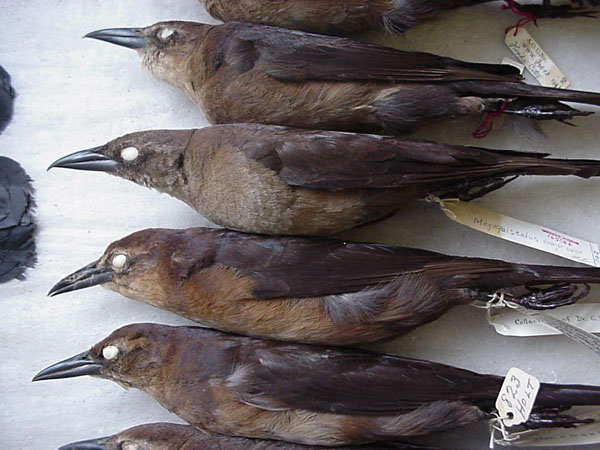
- Partial Albino Red-Winged Blackbird
This bird was discovered on territory and photographed there, singing and acting like every other male Red-winged Blackbird. This mutation seems to occur with some frequency, as there are birds like this in several museum collections, and others have been observed. They vary mostly in the amount of white on the tail, the amount of pale color other than red on the wing, and the heaviness of the streaking on the underparts. Apparently when a male Red-wing is lacking some of its melanin pigments, underlying reds (carotenoids) show up. In addition, perhaps some ancestral blackbird pattern is apparent on the body and tail. All in all, this is one of the most interesting types of albinistic birds.Red-winged Blackbird
East Bay, Olympia, WA
March 11, 2000
Photos by Ruth Sullivan
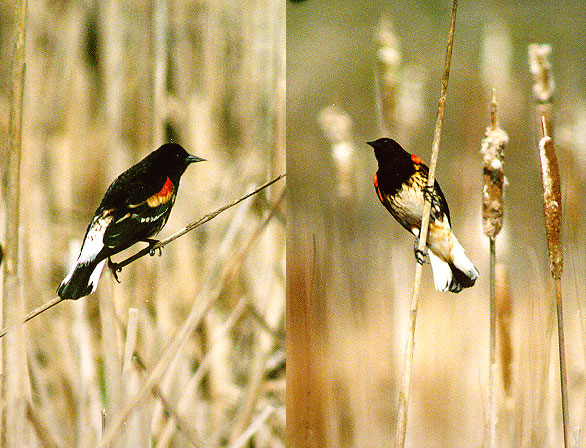
- Red-naped Sapsucker
Juvenile N of Winthrop, WA
July 12, 1996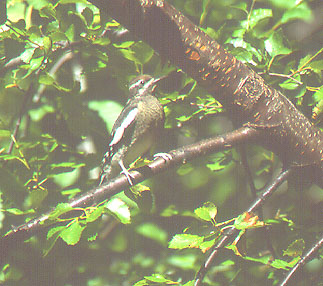
- Ruby-crowned Kinglet/Huttons Vireo Comparison
These two birds were photographed by Ruth Sullivan in her Tacoma yard. Through the magic of Adobe Photoshop, they were joined for comparison. The vireo should be slightly larger than it is, in comparison with the kinglet.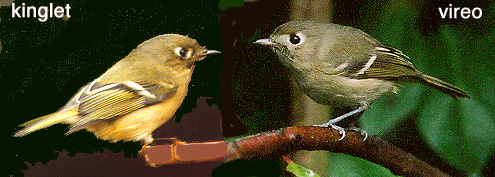
- Savannah Sparrow
Port Angeles, WA
31 Oct 2005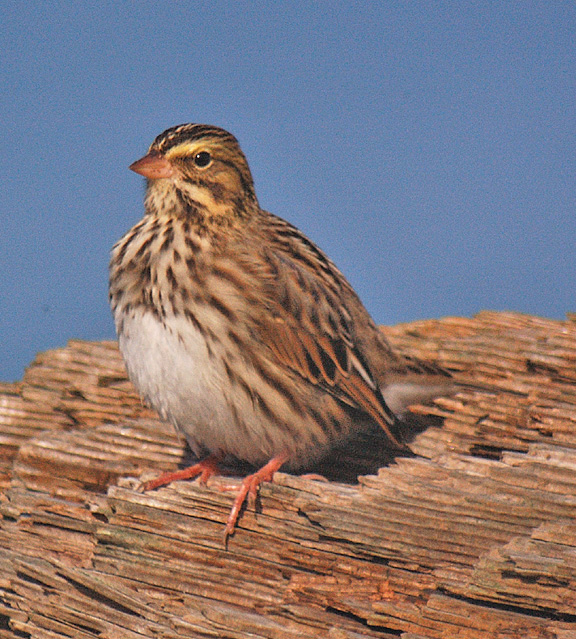
- Seattle parakeet photos
- Song Sparrow
Whidbey Island, WA
November 11, 1978 - Summer Tanager
This male, photographed at Fort Clark Springs, Texas, July 24, 2004, shows the progression of wing molt in a passerine. Note the obvious gaps in the folded wing, where feathers are being replaced. - Townsend's Solitaire
Wanapum State Park, WA
17 Oct 2005 - Violet-green Swallow
Male
Point Grenville, WA
May 20, 1976 - Violet-green Swallow
Female
Point Grenville, WA
May 20, 1976